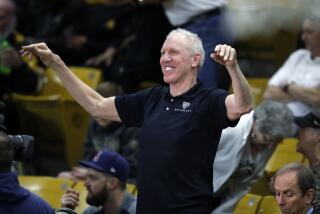Bullets’ Williams Finding His Way, the Right Weigh
WASHINGTON — A year or so ago, when John Williams was a BMOCC--Big Man on Collegiate Courts--his bread-and-butter move was a jump hook from the right side of the lane while moving away from the basket.
“When we (Louisiana State) played Georgetown, I had a lot of success with that move,” he says proudly.
Very few opponents were strong enough to deny Williams, who is 6 feet 9 and weighs 245 pounds, good position. Those with the strength to stop him had to beware of Williams’ quickness and ball-handling ability, a combination that could lead to an easy layup.
Fast forward to Oct. 31, opening night for the Washington Bullets and Williams’ professional debut. The opponents are the defending NBA champion Boston Celtics, and a sellout crowd of 14,890 is fast becoming manic.
Williams finds himself with the ball, on the low post, right side of the lane. Feeling comfortable, he turns to shoot the jump hook. This time, the defender is 7-foot center Robert Parish, a six-time NBA all-star, and the result is a decisive block.
At that moment, it was clear that things would no longer be the same for John Williams, at 20 the youngest player in the league.
Williams has always been able to excel solely on the basis of his sometimes frightening talent. Bullets Coach Kevin Loughery says Williams is the best passer on the team. Assistant Bill Blair says Williams may already be one of the top five passers in the league.
Both statements are in keeping with the team’s thinking last June, when, after selecting him with the 11th pick in the NBA draft, Loughery said Williams was good enough, despite his size, to play point guard.
That has proven to be true. In a practice last week, Williams manned the point in a scrimmage “and looked good, too,” said Bullets General Manager Bob Ferry. The next night, the rookie played in the back court for 29 minutes and contributed nine points, six rebounds and five assists in a 112-97 victory over the Los Angeles Clippers.
The game was the continuation of a trend in which Williams has emerged as one of the Bullets’ most reliable players. In a recent 14-game stretch, he averaged 12.2 points, at times getting that many in one burst. He has had 17 points and three blocked shots against Boston, 21 points against Milwaukee and 12 rebounds against Atlanta, one of the league’s premier rebounding teams. He leads Washington in steals and has shown the rare ability to elevate his teammates’ individual games.
But it has not all been smooth. Last June’s draft was just the first time that Loughery would be amazed by Williams’ size. After an 11-day holdout characterized by some acrimonious negotiations between Ferry and Fred Slaughter, Williams’ agent, the rookie reported to training camp weighing closer to 270 pounds than his projected 240.
The Washington brain trust wasn’t amused, and Williams didn’t find life so funny, either, when Loughery punished him with a steady diet of wind sprints after practice, in addition to the extra work he received during the regularly scheduled workout.
“The way I was playing against pro players in the summer (before training camp) made it seem like it would be easy,” Williams said. “I guess they were saving it all. Training camp was a different story, and then the games themselves were another story. I didn’t expect it.
“This summer’s moves weren’t the same. Then I’d score--in training camp I’d use the same move, and it would get blocked. In the games I’d get the ball back and shoot, and it would get blocked again.”
When Williams talks, it’s in lilting, almost singsong tones. Upon initially meeting someone, he’s likely to say “sir” or “ma’am.” Such unfailing manners might seem surprising from an athlete who grew up and went to high school in central Los Angeles.
“He’s for real,” said Loughery. “You see he’s from L.A. and you make assumptions, but he’s a good, nice kid. Look at the other guys from that school (Crenshaw High)--Darwin (Cook, Bullet guard), Marques Johnson (of the Clippers) and Darryl Strawberry with the Mets--they’re all class acts.”
Williams smiles when asked if he’s too easygoing to make it in the league.
“I don’t think so,” he said. “Try beating me to the ball when the team needs it. Shoot, it’s war out there.”
Perhaps a more telling statement of Williams’ competitiveness comes when he discusses why he decided to leave LSU after just two seasons.
Without a moment’s hesitation he said, “Chris Washburn (the Golden State Warriors rookie who was the third player chosen in the draft). I played against him in high school and did well against him. Then I heard all these people talking about how good he was and how he’d do in the pros. I figured if he was ready to play in the NBA, then I was, too.”
There has been at least one benefit to Williams’ good humor: It has helped him cope with the constant razzing he has received from teammates and coaches. Blair says that Williams “will be as good as he wants to be, he just has to work at it.”
To not so subtly remind the rookie of his weight work, the assistant coach still refers to Williams as “D.B.,” short for Dough Boy. In the locker room after an impressive 12-point, seven-rebound effort in Oakland against Golden State on Dec. 18, Williams was asked by Blair if he planned on celebrating the game with a brace of Big Macs and french fries.
“Salad and Diet Coke, salad and Diet Coke, coach,” came the reply from Williams. “The coaches like messing with me, that’s all,” he continued before dropping his voice to a stage whisper, “I’m tired of the coaches messing with me.”
That has come with the continued loss of weight (Williams now checks in between 245 and 250 pounds) and the increase in responsibilities. Despite being a rookie and out of shape, Williams found himself in the starting lineup on opening night after Jay Vincent ruptured a tendon in his right ring finger during training camp and veteran Darren Daye was released.
Williams went two for 11 from the field against the Celtics, getting nine points and seven rebounds. He also started the next four games before missing three because of back spasms. By the time he returned, Charles Jones was playing well, which led to another adjustment for Williams.
“Starting a game is so much easier, and this was the first time in his life that he had to deal with coming off the bench,” said Loughery. “In college these guys were the stars, and everything was geared around them; but in the pros you don’t have time to wait on one guy. Because he wasn’t conditioned, he was already giving the advantage to some of the greatest players in the world at small forward.”
In a sense, the back spasms worked to Williams’ advantage. First, he continued his conditioning. Sitting on the bench also gave him the opportunity to pick up the rhythms of the game and study the opposition. Perhaps most important, Williams is often playing with an entirely new unit, so he isn’t forced to immediately defer to veteran stars Moses Malone and Jeff Malone. Freer to create, he can set the agenda for the team during his minutes on the floor.
“His confidence has grown tremendously,” said Loughery, who had a talk with Williams early last month to outline his expectations.
“He told me I was going to be deep on the bench,” Williams said. “He said once Jay came back, he was going to try and get the (small forward) spot and that C.J. was playing well, too, so he was going to get some minutes.
“I’m glad he told me that because it woke me up. Since then I’ve tried to play a little better.”
Enough that at his current rate of progress, Williams will soon regain his status as a big man--on any court.
More to Read
Go beyond the scoreboard
Get the latest on L.A.'s teams in the daily Sports Report newsletter.
You may occasionally receive promotional content from the Los Angeles Times.










